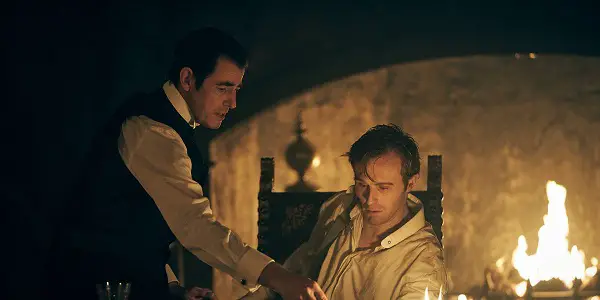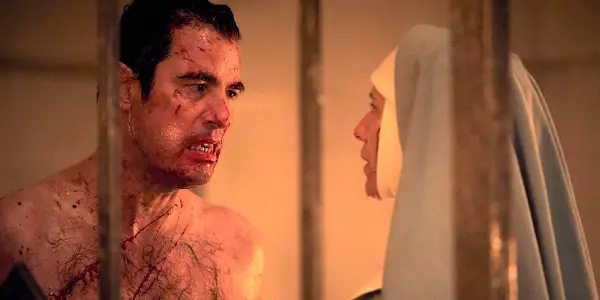DRACULA: A Dribbling, Messy Monster Of A Miniseries

A former video store clerk, Mark has been writing about…
Stephen Moffat more or less delivers the kind of revision of Dracula one would expect given his resume. His past works include restructuring such classic icons of Doctor Who and Sherlock into more modern versions that sometimes have some cleverness but ultimately peter out with interesting ideas. Dracula functions in the same manner, presenting a number of unique takes to the literary legend while still never quite living up to its potential.
A Dracula For Generations
Separated into three 90-minute episodes, the miniseries showcases the centuries-long run of the vampire across many people and eras. Claes Bang plays Dracula initially hobbling in bad elder makeup and later cavorting as a sexy entity. We seem to be mostly at a distance from him, even when he takes the reigns of narrating his stories. While Bang does have a certain allure and takes a certain delight as a villain who can take advantage of humanity in more ways than one, much of it comes off mostly artificial in the assembly, reserving this scene for his creepy gaze and that scene for his one-liner amid violence.

The first episode sets up the classic story as the tragic Jonathan Harker (John Heffernan) relays his experience with meeting Dracula. While not as unique a premise, even with an unreliable storyteller, there is at least some clever and brutal body-horror throughout, with skin torn apart and fingernails coming off. The second episode stages a more unique premise of a murder mystery where we know Dracula is the killer on a ship of shifty people. It’s an idea that never feels exceptionally thought through, almost as aimless as the third episode where Dracula visits modern times, smartphones and all.
Disorientatingly Dismal
Akin to Moffat’s run on Doctor Who, each episode aims to disorient us so we’re constantly questioning or didn’t realize we missed something. This is set up in each opening that forces us to catch up and pay attention. This isn’t always effective. Consider how episode one ends with Sister Agatha Van Helsing (Dolly Wells) cowering after Dracula has just murdered a group of nuns. The second episode begins with Agatha and Dracula having a friendly conversation. What really went down will be revealed but not after an overly long murder mystery where you already know who the killer is.

A Visual Allure
Where the show succeeds at its best is thankfully in its violence. For as much as Dracula tries to win us over with words, it’s his actions that are most engaging. Bang really comes into his own in a sequence where he terrorizes some nuns, taking glee in letting them decide if they’ll be slaughtered by him or chewed up by wolves. Even his entrance into that scene with a decapitation is exceptionally nasty and vicious.
The effects of transforming Bang into a vampire as well as his victims into hideous messes of the undead certainly can’t be overlooked. I dug watching Harker playing a man slowly decaying as much in his body as he was in his mind. Dracula later befriends a modern woman and warps her undead soul into believing she’s not a grotesque corpse walking around. There’s also a great reveal of an undead child who follows Dracula out of a graveyard. So many of these effects are so good that it hurts all the more that they’re in service of a show that never finds its footing.
A Bloody Bore
Dracula’s actions become so routine that they start to lack a real bite after so many hours among him. Every encounter with Dracula feels fairly the same. He makes some small talk, maybe shows off a little dark magic and then sinks his teeth into their necks. This dance continues for so long and sometimes even occurs out of mere boredom within the character or just to acquire new skills. One would think that if Dracula had the ability to absorb intelligence and languages in his blood-sucking that he’d try to do something remarkable with his life.

But Dracula just feels so dull when his whole purpose in life seems to be merely toying with humanity as any cartoonish version of the character would do. He dabbles in a little bit of everything, including sexuality and racism, but to such a minimal degree it’s insulting how the show weaves such ingredients into the mix. It’s also astounding how the show places Dracula in different scenarios with different abilities and never finds a whole lot to do with any of it, hoping you’ll be more amazed at the number of ideas.
Conclusion: Dracula
Dracula is proof that sometimes a story with the villain at the center isn’t always the most compelling narrative. This is a bloody and sloshy mess of a show that never works hard or shows much interest in making the character have an appeal for his immortality, isolation, or even his sexuality. Despite some gorgeous gore for its gothic and modern horror settings, there’s little to sustain anyone who dares dig their teeth into this limp and pale take on the character.
What has been your favorite Dracula adaptation? Let us know in the comments below!
Dracula is currently streaming on Netflix.
Does content like this matter to you?
Become a Member and support film journalism. Unlock access to all of Film Inquiry`s great articles. Join a community of like-minded readers who are passionate about cinema - get access to our private members Network, give back to independent filmmakers, and more.
A former video store clerk, Mark has been writing about film for years and hasn't stopped yet. He studied film and animation in college, where he once set a summer goal to watch every film in the Criterion Collection. Mark has written for numerous online publications and self-published books "Pixels to Premieres: A History of Video Game Movies" and "The Best, Worst, Weird Movies of the 1990s."













